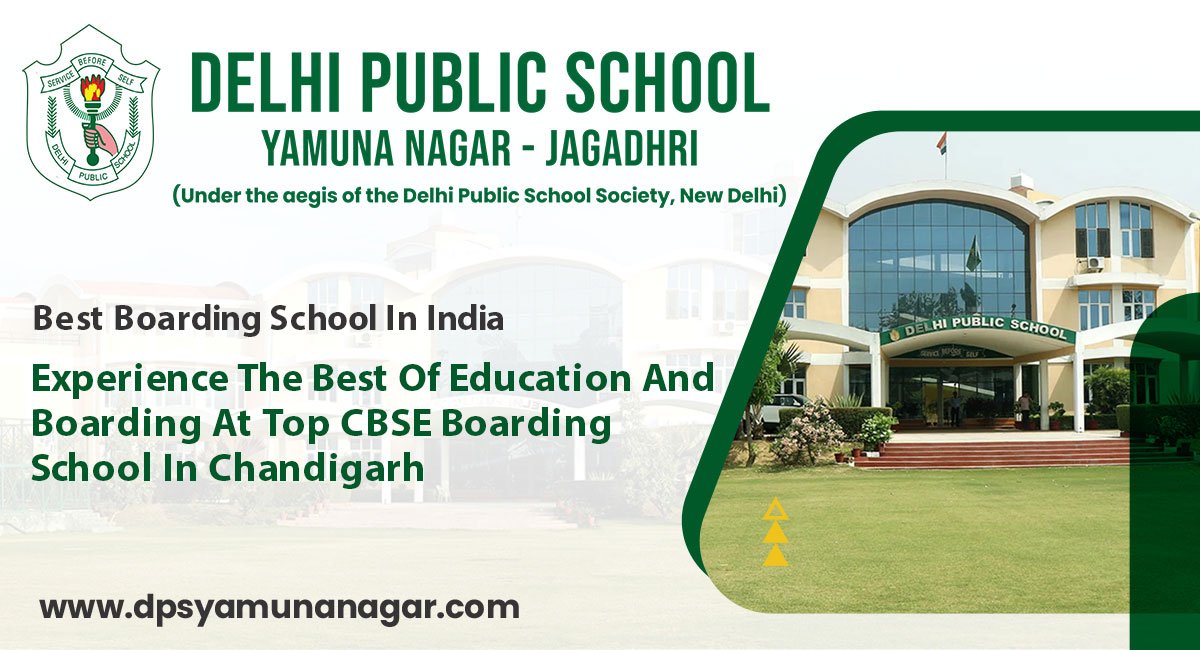Discover the Top CBSE School in Yamuna Nagar – DPS Yamunanagar
Are you searching for the top CBSE school in Yamuna Nagar? Look no further than DPS Yamunanagar. We are a premier educational institution that offers world-class education to students from all over the region. Our school is committed to providing students with a stimulating and supportive environment that enables them…
Discover India’s Finest: A Comprehensive Guide to the Best Boarding School in India
Education is the foundation of a successful life. And when it comes to education, boarding schools are a great option for students who want to experience all-around development. India has some of the best boarding schools in the world, which provide quality education, world-class facilities, and a nurturing environment. In…
Transforming Futures: DPS, the Top Residential School in Haryana for Holistic Education
In the northern state of Haryana, lies one of the most prestigious educational institutions in the country - Delhi Public School (DPS) Yamuna Nagar. It is not just a school but a melting pot of cultures, and ideas and a hub of innovative education. The school is a symbol of…
Experience Excellence at DPS, the Premier Co-ed Boarding School in Haryana, North India
Are you looking for a top-tier co-ed boarding school in Haryana, North India, that offers exceptional academic, athletic, and extracurricular opportunities? Look no further than DPS, one of the best boarding schools in the state. DPS is a residential school that provides an all-around education to its students. It is…
Discover Excellence at the Best Residential School in Chandigarh: Enroll Your Child at DPS Yamunanagar Today!
As a parent, choosing the right school for your child is one of the most important decisions you'll make. In Chandigarh, there are many options to choose from, but if you're looking for the top boarding school in Chandigarh, DPS Yamunanagar is a clear choice. In this blog post, we'll…
Experience Exceptional Education at North India’s Best Residential School: Enroll Your Child at DPS Yamunanagar Today
As a parent, choosing the best education for your child is a crucial decision. One of the most important factors to consider when making this decision is the choice between a day school and a boarding school. While day schools offer the convenience of allowing your child to come home…
Discover Top CBSE Boarding Schools in India: Experience Excellence at DPS Yamunanagar
Introduction: Boarding schools in India have gained immense popularity in recent years. Many parents believe that boarding schools provide a better and more comprehensive education to their children. The Central Board of Secondary Education (CBSE) is a highly regarded education board in India, and many parents prefer to enroll their…
Discover the Best CBSE Boarding Schools in India – DPS Yamuna Nagar for Holistic Education & Growth!
When it comes to providing the best education and overall development of a child, boarding schools have always been a preferred choice. Not only do they offer quality education but also provide ample opportunities for extracurricular activities and personal growth. India is home to many top residential schools that have…
Experience The Best Of Education And Boarding At Top CBSE Boarding School In Chandigarh
Education is one of the most essential aspects of life. It plays a vital role in shaping an individual's personality, thoughts, and beliefs. And when it comes to providing the best education, boarding schools are an excellent choice. Boarding schools not only provide a comprehensive education but also offer a…
Experience Holistic Education and Life Skills at the Best Residential School in Yamuna Nagar – DPS Yamuna Nagar
Experience Holistic Education and Life Skills at the Best Residential School in Yamuna Nagar - DPS Yamuna Nagar Boarding schools are becoming increasingly popular among parents who want their children to receive a high-quality education in a nurturing environment. Yamuna Nagar in Haryana is home to some of the best…
Discover Excellence in Education: Explore the Best Schools in Yamuna Nagar – DPS Yamuna Nagar
Discover Excellence in Education: Explore the Best Schools in Yamuna Nagar - DPS Yamuna Nagar Education is the foundation of a strong society and the key to unlocking an individual's potential. In the modern age, education is more important than ever before. It is not just about academics but also…
Discover Excellence in Education and Accommodation at DPS Yamunanagar, the Best Residential School in Haryana
Education is the cornerstone of a successful and fulfilling life. As parents, we all want the best education for our children, and choosing the right school is one of the most crucial decisions we can make. Haryana, a state in Northern India, is home to some of the best schools…
Experience World-Class Education and Accommodation at Top Residential School in India – DPS Yamunanagar
If you are looking for a top residential school in India that offers world-class education and accommodation, then DPS Yamunanagar is the place to be. As one of the best Co-ed boarding schools in India, DPS Yamunanagar has consistently delivered quality education to its students for many years. The school…
DPS Yamunanagar: Top Co-ed Boarding School in India for Holistic Education & Growth
If you are looking for a top residential school in India that provides a holistic education and fosters the overall growth of your child, then DPS Yamunanagar is the perfect destination. Located in the heart of Haryana in North India, DPS Yamunanagar is considered to be one of the best…
Discover the Best Boarding School in Haryana for Your Child’s Growth and Development!
Discover the Best Boarding School in Haryana for Your Child's Growth and Development! Choosing the right school for your child is a crucial decision that can shape their future. Boarding schools are a great option for parents who want their children to receive a quality education, develop independence, and learn…
Discover the Top CBSE School in Yamuna Nagar for Your Child’s Bright Future!
Delhi Public School Yamunanagar: Discover the Top CBSE School in Yamuna Nagar for Your Child's Bright Future When it comes to selecting a school for your child, there are various factors to consider, including quality education, experienced faculty, modern infrastructure, and a nurturing environment. One school that ticks all these…
Experience Holistic Education at the Best Residential School in Yamuna Nagar, North India!
Education is the foundation for a bright future, and choosing the right school for your child is a crucial decision. If you are looking for a school that offers quality education and holistic development, then look no further than Delhi Public School Yamuna Nagar. Located in the heart of North…
Discover the Best CBSE School in Chandigarh for Your Child’s Bright Future!
Education plays a crucial role in shaping a child's future. Hence, choosing the right school for your child is an important decision. Chandigarh, the capital city of Punjab and Haryana, is a hub for education and offers some of the best CBSE schools in India. With so many options available,…
Experience Exceptional Education and Comfortable Boarding at the Top Residential School in India – DPS Yamuna Nagar
As parents, we all want to provide the best education to our children, and in the process, give them an opportunity to grow and excel in all areas of their life. One of the best ways to ensure this is by sending them to a top boarding school. The experience…
Explore the Best CBSE Boarding Schools in North India with DPS Yamunanagar!
DPS Yamunanagar is one of the best CBSE boarding schools in North India, offering high-quality education and a nurturing environment for students. Located in the heart of Haryana, this residential school is known for its excellent facilities, experienced faculty, and comprehensive curriculum. If you are looking for a top boarding…
Discover the Best Boarding Schools near Chandigarh – Unlock a World of Advantages with DPS Yamunanagar!
DPS Yamunanagar is one of the best boarding schools in the region, located in close proximity to Chandigarh. It is known for its excellent academic programs, state-of-the-art facilities, and experienced faculty. In this blog, we will explore the advantages of attending a top boarding school in Chandigarh, and how DPS…
DPS Yamuna Nagar: Where Excellence Meets Boarding – The Top School in Haryana for North India’s Brightest Minds
DPS Yamuna Nagar is one of the best residential schools in Haryana and is regarded as the top boarding school in North India. The school has consistently proven its excellence in academics and extracurricular activities, making it one of the best CBSE boarding schools in Haryana. Here are some reasons…
Discover the Best CBSE School in Chandigarh – Join DPS Yamunanagar Today!
Discover the Best CBSE School in Chandigarh - Join DPS Yamunanagar Today! Chandigarh, the capital city of Punjab and Haryana, is known for its excellent educational institutions. Parents in the region are always looking for the best school for their children, and if you are one of them, then you…
Experience World-Class Education and Life Skills at the Top Residential School in North India – DPS Yamunanagar
Experience World-Class Education and Life Skills at the Top Residential School in North India - DPS Yamunanagar As parents, we all want the best for our children, especially when it comes to their education. Choosing the right school can make all the difference in shaping their future. With so many…
Discover Excellence in Education at DPS Yamunanagar – One of the Best Schools in Haryana.
Discover Excellence in Education at DPS Yamunanagar - One of the Best Schools in Haryana As parents, we always strive to give our children the best education possible. Choosing the right school can be a daunting task, especially when you live in a state like Haryana, which has numerous educational…
Discover the Benefits of Day Boarding School in Yamuna Nagar – A Perfect Choice for Your Child’s Education!
As a parent, you always want the best for your child, and choosing the right school is one of the most important decisions you will make. Boarding schools have been around for centuries and have always been associated with providing high-quality education, character-building, and a nurturing environment for students. However,…
Experience Excellence at the Best Boarding School in North India
Choosing the right boarding school for your child can be a daunting task, especially when it comes to finding the best option in North India. Fortunately, D.P.S. Yamuna Nagar is widely regarded as one of the top CBSE boarding schools in north India the region, offering an exceptional education and…
Achieve Excellence at the Best CBSE Boarding School in Chandigarh – Enroll Your Child Today!
When it comes to providing quality education, parents are always on the lookout for the best. This is especially true when it comes to boarding schools, where children not only receive education but also live and grow. Chandigarh, a beautiful and modern city, has some of the best CBSE boarding…
Find the Best Schools in Yamuna Nagar – D.P.S. Yamuna Nagar
Best CBSE Schools in Yamuna Nagar: Delhi Public School - A Leader in Education When it comes to choosing the best school for your child, there are countless options available. However, few schools can compare to the quality of education provided by Delhi Public School Yamuna Nagar. This CBSE-affiliated school…
Discover the Top Co-Ed Boarding School in India – Empowering the Future Generation
Boarding schools have been a part of India's educational landscape for centuries and have been providing students with a unique and challenging environment that prepares them for success in life. With a focus on personal growth, independence, and well-rounded development, top boarding schools in India have a proven track record…
Choosing DPS Yamuna Nagar as your CBSE boarding school will help you achieve excellence
Boarding schools have been known to offer a unique learning experience that goes beyond the traditional classroom setting. The all-round development of a student is the primary focus of these schools, and students are encouraged to participate in various extracurricular activities, sports and other social events. This provides an opportunity…
Discover the Top Boarding School in North India: A World-Class Education Awaits!
Boarding schools in North India are a hub of education and a source of inspiration for students looking to better themselves. With their focus on holistic development, a strong academic curriculum, and top-notch facilities, these schools are making waves in the education world. So, if you're looking for the best…
Discover the Elite Boarding School Experience in Chandigarh: Where Excellence Meets Ambition
Discover the Elite Boarding School Experience in Chandigarh: Where Excellence Meets Ambition Chandigarh, a city beautiful, is renowned for its progressive and modern education system. As a parent, if you're looking for the best boarding school in Chandigarh for your child, Chandigarh is the place to be. The city boasts…
Discovering Excellence: A Journey to the Top Boarding Schools in North India
Boarding schools have always been a popular choice for parents seeking quality education for their children. North India is home to some of the best boarding schools in the country, providing students with a unique opportunity to grow both academically and personally. The quality education and wholesome environment offered by…
Find the Best Boarding Schools in India: A Guide to the Top-Rated Schools
Boarding schools have always been the preferred choice for parents who want their children to receive an excellent education and overall development. With a wide range of boarding schools available in India, it can be challenging to choose the best one. To make this task easier, we've compiled a comprehensive…
What Are the Tips to Find the Best Residential School for Children?
Choosing a boarding school is indeed one of the crucial decisions that every parent has to make for their child. However, there are various considerable factors when selecting the best-coed boarding schools in India. For example, what type of curriculum the school follows, is there any extracurricular activities the school…
How does Boarding School Help Turning a Child’s Hobby into A Successful Career?
Boarding schools have been seen as one of the best solutions for both parents and children. Boarding school not only help students to get good grades but also support them in turning their hobbies & passion into a career and nurture them in every possible way. Top CBSE boarding school…
How to get admission into Best Schools in Yamuna Nagar & Day Boarding Schools in 2023-2024?
To get admission into the best schools in Yamuna Nagar and day boarding schools in 2023-2024, you will need to follow the admissions process for the specific schools you are interested in attending. Here are some general steps you can follow: Research schools: Start by researching the top CBSE school…
What You Need to Know About Kids and ILL effect on the Internet best boarding schools in Haryana
It is important for children to use the internet safely and responsibly. Children may be more vulnerable to the adverse effects of the internet, such as exposure to inappropriate content, cyberbullying, and online predators. It is important for parents and caregivers to monitor and regulate their children's internet use and…
What are the Best Co-ed Boarding Schools in India that Foster Discipline in their Students?
Here are a few co-ed boarding schools in India that are known for fostering discipline in their students: Delhi Public School, Yamunanagar: Delhi Public School (DPS) Yamunanagar is a best coed boarding schools in india located in Yamunanagar, Haryana. It is affiliated with the Delhi Public School Society, which is…
How Good is the Future of Your Child if It Attends a Boarding School in North India?
It's difficult to say how good the future of a child will be if they attend a boarding school in North India, as it ultimately depends on the individual child and their efforts and abilities. However, attending a boarding school can provide many opportunities and benefits that can help a…
Which is Better for your Child: Coed or Gender-Specific Schools?
There is no one-size-fits-all answer to this question, as the best school for your child will depend on their individual needs and preferences. Both coed and gender-specific schools can have their own unique benefits and drawbacks. One potential advantage of Co-ed boarding school in Haryana is that they may offer…












































